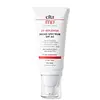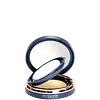What's inside
What's inside
 Key Ingredients
Key Ingredients

 Benefits
Benefits

 Concerns
Concerns

 Ingredients Side-by-side
Ingredients Side-by-side

Zinc Oxide 10%
Cosmetic ColorantTitanium Dioxide 5.5%
Cosmetic ColorantWater
Skin ConditioningCaprylic/Capric Triglyceride
MaskingC15-19 Alkane
SolventOctyldodecyl Neopentanoate
EmollientButyloctyl Salicylate
Skin ConditioningCetyl Dimethicone
EmollientHydrogenated Polyisobutene
EmollientMica
Cosmetic ColorantDimethicone
EmollientSorbitan Olivate
EmulsifyingPolyglyceryl-6 Polyricinoleate
EmulsifyingPolyhydroxystearic Acid
EmulsifyingSodium Chloride
MaskingPhenoxyethanol
PreservativePolyglyceryl-2 Isostearate
EmulsifyingDisteardimonium Hectorite
StabilisingGlycerin
HumectantXanthan Gum
EmulsifyingTriethoxycaprylylsilane
Euphorbia Cerifera Wax
Sodium Hyaluronate
HumectantDisodium EDTA
Ethylhexylglycerin
Skin ConditioningGlyceryl Behenate
EmollientSilica
AbrasiveAscorbyl Palmitate
AntioxidantTocopheryl Acetate
AntioxidantZinc Oxide 10%, Titanium Dioxide 5.5%, Water, Caprylic/Capric Triglyceride, C15-19 Alkane, Octyldodecyl Neopentanoate, Butyloctyl Salicylate, Cetyl Dimethicone, Hydrogenated Polyisobutene, Mica, Dimethicone, Sorbitan Olivate, Polyglyceryl-6 Polyricinoleate, Polyhydroxystearic Acid, Sodium Chloride, Phenoxyethanol, Polyglyceryl-2 Isostearate, Disteardimonium Hectorite, Glycerin, Xanthan Gum, Triethoxycaprylylsilane, Euphorbia Cerifera Wax, Sodium Hyaluronate, Disodium EDTA, Ethylhexylglycerin, Glyceryl Behenate, Silica, Ascorbyl Palmitate, Tocopheryl Acetate
1,2-Hexanediol
Skin ConditioningAcrylates/Dimethicone Copolymer
Skin ConditioningAlumina
AbrasiveBis-Vinyl Dimethicone/Dimethicone Copolymer
Emulsion StabilisingBisabolol
MaskingBrassica Campestris Sterols
EmollientButyloctyl Salicylate
Skin ConditioningCaprylic/Capric Triglyceride
MaskingCaprylyl Glycol
EmollientCerium Oxide
Cetylhydroxyproline Palmitamide
Skin ConditioningDimethicone
EmollientDimethicone/Vinyl Dimethicone Crosspolymer
Skin ConditioningDisteardimonium Hectorite
StabilisingEthylhexylglycerin
Skin ConditioningHexyldecanol
EmollientHimanthalia Elongata Extract
Skin ProtectingHydrogenated Vegetable Oil
EmollientIron Oxides
Laureth-25
CleansingLaureth-3
EmulsifyingMica
Cosmetic ColorantOctyldodecyl Neopentanoate
EmollientOzokerite
Emulsion StabilisingPhenethyl Alcohol
MaskingPhenoxyethanol
PreservativePhenyl Trimethicone
Skin ConditioningPlankton Extract
Skin ConditioningPolyethylene
AbrasivePolyhydroxystearic Acid
EmulsifyingPolymethyl Methacrylate
Prunus Armeniaca Kernel Oil
MaskingSilica
AbrasiveSimethicone
EmollientSodium Chloride
MaskingStearic Acid
CleansingTocopherol
AntioxidantTocopheryl Acetate
AntioxidantTribehenin
EmollientTriethoxycaprylylsilane
Vinyl Dimethicone/Methicone Silsesquioxane Crosspolymer
Water
Skin ConditioningZingiber Officinale Root Extract
Masking1,2-Hexanediol, Acrylates/Dimethicone Copolymer, Alumina, Bis-Vinyl Dimethicone/Dimethicone Copolymer, Bisabolol, Brassica Campestris Sterols, Butyloctyl Salicylate, Caprylic/Capric Triglyceride, Caprylyl Glycol, Cerium Oxide, Cetylhydroxyproline Palmitamide, Dimethicone, Dimethicone/Vinyl Dimethicone Crosspolymer, Disteardimonium Hectorite, Ethylhexylglycerin, Hexyldecanol, Himanthalia Elongata Extract, Hydrogenated Vegetable Oil, Iron Oxides, Laureth-25, Laureth-3, Mica, Octyldodecyl Neopentanoate, Ozokerite, Phenethyl Alcohol, Phenoxyethanol, Phenyl Trimethicone, Plankton Extract, Polyethylene, Polyhydroxystearic Acid, Polymethyl Methacrylate, Prunus Armeniaca Kernel Oil, Silica, Simethicone, Sodium Chloride, Stearic Acid, Tocopherol, Tocopheryl Acetate, Tribehenin, Triethoxycaprylylsilane, Vinyl Dimethicone/Methicone Silsesquioxane Crosspolymer, Water, Zingiber Officinale Root Extract
 Reviews
Reviews

Ingredients Explained
These ingredients are found in both products.
Ingredients higher up in an ingredient list are typically present in a larger amount.
Butyloctyl Salicylate is a chemical UV filter structurally similar to octisalate. It is a photostabilizer, SPF booster, emollient and solvent. This ingredient helps evenly spread out ingredients.
According to a manufacturer, it is suitable for pairing with micro Titanium Dioxide, Zinc Oxide, and pigments.
Photostabilizers help stabilize UV-filters and prevents them from degrading quickly.
Learn more about Butyloctyl SalicylateThis ingredient is an emollient, solvent, and texture enhancer. It is considered a skin-softener by helping the skin prevent moisture loss.
It helps thicken a product's formula and makes it easier to spread by dissolving clumping compounds.
Caprylic Triglyceride is made by combining glycerin with coconut oil, forming a clear liquid.
While there is an assumption Caprylic Triglyceride can clog pores due to it being derived from coconut oil, there is no research supporting this.
Learn more about Caprylic/Capric TriglycerideDimethicone is a type of synthetic silicone created from natural materials such as quartz.
What it does:
Dimethicone comes in different viscosities:
Depending on the viscosity, dimethicone has different properties.
Ingredients lists don't always show which type is used, so we recommend reaching out to the brand if you have questions about the viscosity.
This ingredient is unlikely to cause irritation because it does not get absorbed into skin. However, people with silicone allergies should be careful about using this ingredient.
Note: Dimethicone may contribute to pilling. This is because it is not oil or water soluble, so pilling may occur when layered with products. When mixed with heavy oils in a formula, the outcome is also quite greasy.
Learn more about DimethiconeDisteardimonium Hectorite comes from the clay mineral named hectorite. It is used to add thickness to a product.
It can also help stabilize a product by helping to disperse other ingredients.
Hectorite is a rare, white clay mineral.
Learn more about Disteardimonium HectoriteEthylhexylglycerin (we can't pronounce this either) is commonly used as a preservative and skin softener. It is derived from glyceryl.
You might see Ethylhexylglycerin often paired with other preservatives such as phenoxyethanol. Ethylhexylglycerin has been found to increase the effectiveness of these other preservatives.
Mica is a naturally occurring mineral used to add shimmer and color in cosmetics. It can also help improve the texture of a product or give it an opaque, white/silver color.
Serecite is the name for very fine but ragged grains of mica.
This ingredient is often coated with metal oxides like titanium dioxide. Trace amounts of heavy metals may be found in mica, but these metals are not harmful in our personal products.
Mica has been used since prehistoric times throughout the world. Ancient Egyptian, Indian, Greek, Roman, Aztec, and Chinese civilizations have used mica.
Learn more about MicaWe don't have a description for Octyldodecyl Neopentanoate yet.
Phenoxyethanol is a preservative that has germicide, antimicrobial, and aromatic properties. Studies show that phenoxyethanol can prevent microbial growth. By itself, it has a scent that is similar to that of a rose.
It's often used in formulations along with Caprylyl Glycol to preserve the shelf life of products.
Polyhydroxystearic Acid is a soft wax made from castor oil.
It is is a texture thickener, emulsifier, and film-former. Emulsifiers prevent ingredients from separating, such as oils and waters.
Polyhydroxystearic Acid may not be fungal acne safe.
Learn more about Polyhydroxystearic AcidSilica, also known as silicon dioxide, is a naturally occurring mineral. It is used as a fine, spherical, and porous powder in cosmetics.
Though it has exfoliant properties, the function of silica varies depending on the product.
The unique structure of silica enhances the spreadability and adds smoothness, making it a great texture enhancer.
It is also used as an active carrier, emulsifier, and mattifier due to its ability to absorb excess oil.
In some products, tiny microneedles called spicules are made from silica or hydrolyzed sponge. When you rub them in, they lightly polish away dead skin layers and enhance the penetration of active ingredients.
Learn more about SilicaChances are, you eat sodium chloride every day. Sodium Chloride is also known as table salt.
This ingredient has many purposes in skincare: thickener, emulsifier, and exfoliator.
You'll most likely find this ingredient in cleansers where it is used to create a gel-like texture. As an emulsifier, it also prevents ingredients from separating.
There is much debate on whether this ingredient is comedogenic. The short answer - comedogenic ratings don't tell the whole story. Learn more about comegodenic ratings here.
The concensus about this ingredient causing acne seems to be divided. Research is needed to understand if this ingredient does cause acne.
Scrubs may use salt as the primary exfoliating ingredient.
Learn more about Sodium ChlorideTocopheryl Acetate is AKA Vitamin E. It is an antioxidant and protects your skin from free radicals. Free radicals damage the skin by breaking down collagen.
One study found using Tocopheryl Acetate with Vitamin C decreased the number of sunburned cells.
Tocopheryl Acetate is commonly found in both skincare and dietary supplements.
Learn more about Tocopheryl AcetateTriethoxycaprylylsilane is a silicone used to bind and stabilize ingredients.
As an emulsifier, it helps prevent ingredients from separating. This can help elongate the shelf life of products.
Triethoxycaprylylsilane is often used to coat mineral sunscreens ingredients to help give a better feel. It also helps reduce oxidative stress in sunscreens.
Learn more about TriethoxycaprylylsilaneWater. It's the most common cosmetic ingredient of all. You'll usually see it at the top of ingredient lists, meaning that it makes up the largest part of the product.
So why is it so popular? Water most often acts as a solvent - this means that it helps dissolve other ingredients into the formulation.
You'll also recognize water as that liquid we all need to stay alive. If you see this, drink a glass of water. Stay hydrated!
Learn more about Water